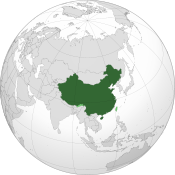China ends presidential term limits in constitutional amendment
Tuesday, March 13, 2018

Image: VOA.
On Sunday, China's National People's Congress (NPC) voted to amend the Constitution of the People's Republic of China in several ways, including eliminating term limits for the offices of President and Vice President. The changes mean Xi Jinping may be President for life if he so chooses.
The vote in the legislature was nearly unanimous. 2958 votes were cast in favor, two opposed, three abstained. Without this change, Xi would be required to leave office in 2023. In another change, Xi's own political theory was written into the constitution. "Xi Jinping thought", as the theory is also known, was approved by the Communist Party of China in the autumn of 2017.
Shen Chunyao, the chairperson for the Commission for Legislative Affairs of the NPC, told Xinhua News Agency, "As an important content of the amendment, the inclusion of Xi's thought into the country's fundamental law reflects the common aspiration of the entire Communist Party of China and all Chinese people of various ethnic groups".
News media reported a backlash to the news on the Internet. In response, state censors were blocking images of Winnie the Pooh and words like "I disagree" and "Emperor". Reuters reported difficulties in getting reactions to the lifting of term limits from members of the congress, one woman choosing to remain anonymous and remarking, "You can't ask me that".
Under China's constitution, the presidency is a largely ceremonial office with limited powers. However, since 1993, as a matter of convention, the presidency has been held simultaneously by the General Secretary of the Communist Party of China, the top leader in the one-party communist state. Xi Jinping's powerful positions as General Secretary and Chairman of the Central Military Commission do not have any term limit.
Sources
- "China parliament scraps presidential term limits" — Al Jazeera, March 11, 2018
- Lu Hui. "China's national legislature adopts landmark constitutional amendment" — Xinhua News Agency, March 11, 2018
- "China's Xi allowed to remain 'president for life' as term limits removed" — BBC News, March 11, 2018
- Ben Blanchard, Christian Shepherd. "China allows Xi to remain president indefinitely, tightening his grip on power" — Reuters, March 11, 2018
- Chris Buckley and Adam Wu. "Ending Term Limits for China’s Xi Is a Big Deal. Here’s Why. - Is the presidency powerful in China?" — The New York Times, March 10, 2018
- Clayton Dube. "USC and China in the News: January and February 2018 - February 27, 2018: CNN" — CNN, February 27, 2018

